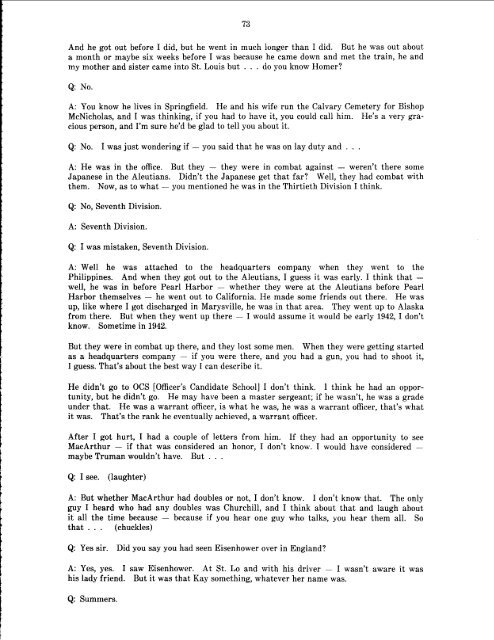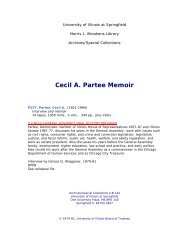Leland J. Kennedy Memoir - University of Illinois Springfield
Leland J. Kennedy Memoir - University of Illinois Springfield
Leland J. Kennedy Memoir - University of Illinois Springfield
You also want an ePaper? Increase the reach of your titles
YUMPU automatically turns print PDFs into web optimized ePapers that Google loves.
And he got out before I did, but he went in much longer than I did. Rut he was out about<br />
a month or maybe six weeks before I was because he came down and met the train, he and<br />
my mother and sister came into St. Louis but . . . do you know Homer?<br />
Q: No.<br />
A: You know he lives in <strong>Springfield</strong>. He and his wife run the Calvary Cemetery for Bishop<br />
McNicholas, and I was thinking, if you had to have it, you could call him. He's a very gracious<br />
person, and I'm sure he'd he glad to tell you about it.<br />
Q: No. I was just wondering if - you said that he was on lay duty and . . .<br />
A: He was in the <strong>of</strong>fice. But they - they were in combat against - weren't there some<br />
Japanese in the Aleutians. Didn't the Japanese get that far? Well, they had combat with<br />
them. Now, as to what - you mentioned he was in the Thirtieth Division I think.<br />
Q: No, Seventh Division.<br />
A: Seventh Division.<br />
Q: I was mistaken, Seventh Division.<br />
A: Well he was attached to the headquarters company when they went to the<br />
Philippines. And when they got out to the Aleutians, I guess it was early. I think that -<br />
well, he was in before Pearl Harbor - whether they were at the Aleutians before Pearl<br />
Harbor themselves - he went out to California. He made some friends out there. He was<br />
up, like where I got discharged in Marysville, he was in that area. They went up to Alaska<br />
from there. But when they went up there - I would assume it would be early 1942, I don't<br />
know. Sometime in 1942.<br />
But they were in combat up there, and they lost some men. When they were getting started<br />
as a headquarters company - if you were there, and you had a gun, you had to shoot it,<br />
I guess. That's about the best way I can describe it.<br />
He didn't go to OCS [Officer's Candidate School] I don't think. 1 think he had an opportunity,<br />
but he didn't go. He may have been a master sergeant; if he wasn't, he was a grade<br />
under that. He was a warrant <strong>of</strong>ficer, is what he was, he was a warrant <strong>of</strong>ficer, that's what<br />
it was. That's the rank he eventually achieved, a warrant <strong>of</strong>ficer.<br />
After I got hurt, I had a couple <strong>of</strong> letters from him. If they had an opportunity to see<br />
MacArthur - if that was considered an honor, I don't know. I would have considered -<br />
maybe Truman wouldn't have. But . . .<br />
Q: I see. (laughter)<br />
A: But whether MacArthur had doubles or not, I don't know. I don't know that. The only<br />
guy I heard who had any doubles was Churchill, and I think about that and laugh about<br />
it all the time because - because if you hear one guy who talks, you hear them all. So<br />
that . . . (chuckles)<br />
Q: Yes sir. Did you say you had seen Eisenhower over in England?<br />
A: Yes, yes. I saw Eisenhower. At St. Lo and with his driver - I wasn't aware it was<br />
his lady friend. But it was that Kay something, whatever her name was.<br />
Q: Summers.
















